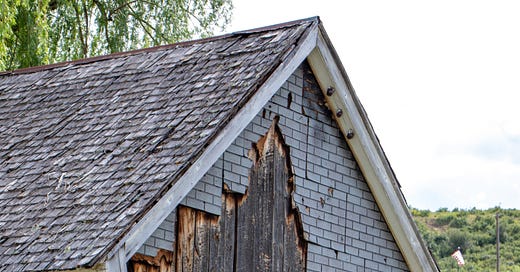Are your sheep dirty?
Want to clean their wool before you shear them? Here’s how: Lather the animals, force them to swim across a flowing creek. When they emerge, their wool will be white.
This sort of know-how fills Farmer Boy, a children’s book about Almanzo Wilder’s boyhood on a family farm. (Almanzo grew up to marry Laura Ingalls; the book is second in the Little House series.) The story centers on his decision to remain a farmer, but for me the fascination lay in the setting. In the mid 19th century, before farms had machinery, this family was able to reap abundance from the land. Their array of skills impressed me deeply. Cold snap? Protect the young corn one way, the barley shoots another, the wheat still another. Winter approaches? Stew chicken, salt pork, make beef jerky. To make a sled, cut down a tree, find a sawmill, then soak the lumber until it can be bent. And so on and on.
All of this left me astonished and a bit bereft. “What skills do we have?” I could think of nothing except driving.
It took remarkably long for my blindness to lift. Gradually I came to appreciate the know-how that that makes our world work: Not just the skilled labor of road workers, but the engineers who designed the project, the managers who run it, and so on, indefinitely. So much intelligence and hard work go into making this complicated world work; many more kinds of know-how than sustained the 19th century world. Eventually I recognized how my own digital and bureaucratic skills, paltry though they seem, are constantly in use: arranging a trip, researching a ballot, paying (or challenging) a bill.
Nevertheless, my unease persisted. Do we get as much satisfaction from what we do? For the most part, yes. Their healthy animals and well-stocked pantry were achievements. So, today, is a well-taught class , a patient no longer in pain , a beautiful garden.
Does it matter that so much of our success depends on others? We are often small parts of large projects, while the Wilders are pictured as self-sufficient. That self-sufficiency is exaggerated, for ideological reasons, and in any case group success can be intensely rewarding. (Recall how the NASA control room erupts in hugs and cheers when a mission is successful.) But it was to some extent the wholeness of farm life that reached me, the day by day satisfaction of finishing jobs they had themselves begun – the biscuits at Thanksgiving began with wheat sown months before.
In contrast, many of my own successes are trivial and temporary: getting through voicemail hell, filling out inscrutable forms, trying to change a password, and so, endlessly, on. Solving that kind of problem is usually a relief rather a satisfaction. Each feels like a one-off, rarely improving my understanding of the larger picture. (Maybe the young, digital natives, feel differently.) For the Wilders, in contrast, learning to heal a sick animal or use a new herb broadened their realm of competence
So, many factors led to my sense of loss after reading Farmer Boy.
But the deepest, I now think, was how embodied the family’s skills were. They dealt physically rather than virtually with the world around them, using their bodies as well as their brains. They saw, felt, and changed the natural world. We do some of the same when we cook, clean, or garden, but those tasks are usually peripheral to our main work.
The term that comes to mind is nature deficit – not the disorder, just a distance from the natural world, a specific kind of loss.
I began to think of the issue in terms of a nature deficit. The pandemic lessened my deficit (I had read Farmer Boy before Covid hit.) The lockdown sent me, like so many others, outdoors; long walks saved my sanity and fed my soul. I live in an area laced with paths and trails, few of which I knew before March 2020. Now I have a long annotated list.
My skills still don’t extend much to shaping the natural world – my life doesn’t require it, and in general the world is better for my not trying. But those walks have extended my knowledge a little; I can distinguish a spruce tree from a pine, and both from cedar. I’m thrilled when I recognize a downy woodpecker.
Working these thoughts out has helped me deal more patiently with daily petty frustrations (cyber and otherwise), and to appreciate the skills that sustain our world – including my own skills. And to protect the time I can spend outside.
It’s all good.
Afterwords
The loss I felt was not nostalgia. I do not want to live so close to destitution (which is more vivid in other books of the series, like On the Banks of Plum Creek.) And much as I admired the abilities of the visiting cobbler, who took a full day to make a single pair of boots, I prefer my local shoe store. Or online catalog.
For details on how the series exaggerates pioneer self-sufficiency, and how that resonates today, see Little House, Long Shadow. (The erasure of, especially, government help arose from anger at the New Deal. ) Especially striking is the sense of grievance in Little House on the Prairie, when the Ingalls family was forced to leave “their” land – because the government returned it to Indians.
Nice example of how many skills are engaged in science — finding an answer, even posing the right question — not to mention writing and producing a 13 minute video about it.
Jane Smiley’s novella Good Will, (bound together with Ordinary Love) describes a 20th century family trying to live a 19th century life, and its unexpected consequences.




